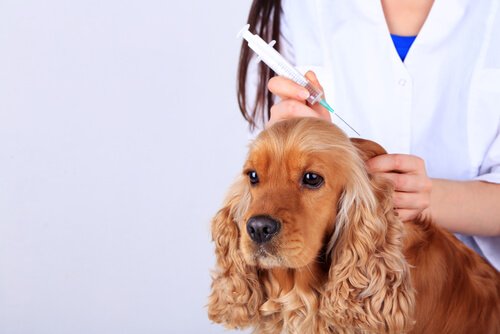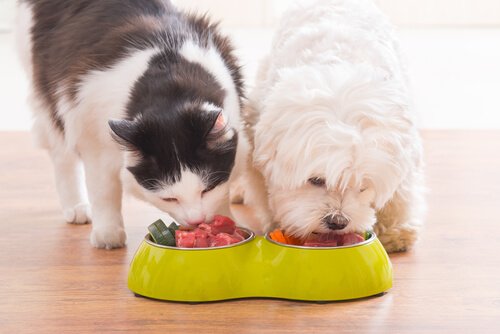Preventative Medicine for Pets
Preventative medicine for pets consists of simple and effective care for keeping them healthy. By taking just a few minutes out of your day, it is possible to protect them from serious illnesses and to improve their quality of life.
The pillars of preventative medicine for pets
“Prevention is better than treatment”: this golden rule also applies to the health of our pets.
We want to clarify that any preventative medicine for pets must include periodic check-ups with the veterinarian. They are the only qualified professionals to recommend products and preventative measures for each animal.
Respect the vaccination card
For most serious illnesses, vaccination is the only efficient form of prevention. Therefore, there is no preventative medication for pets without responsible vaccination.

Oral and dental hygiene and care
Animals need oral care to digest correctly and to prevent the spread of microorganisms. And it is important to start this care when they are puppies.
Oral health diseases are common when there is a large accumulation of plaque on the teeth and gums. Halitosis is usually the first sign that something is wrong in your pet’s mouth. This is usually caused by poor dental hygiene.
Using special products for animal use only, the recommendation is to brush the animal’s teeth two to three times a week. Human toothpaste can cause damage to the tooth enamel and poison the pet.
If your pet shows signs of a severe accumulation of plaque, the veterinarian will recommend professional cleaning with surgical intervention.
Internal and external deworming
Deworming and vaccination are the key to preventative medicine for pets. The most essential part of deworming is keeping up the frequency of treatment and choosing the correct products.
The recommendation for external deworming is to use pipettes or sprays at least twice a year. It is important to follow the application instructions from the veterinarian and the manufacturer. Additionally, you can use anti-tick and flea collars or soaps.
For internal deworming, you must also repeat the treatment every six months. The concentration of the active ingredient depends upon the animal’s age and weight.
All products have an expiration date. When it expires, its strength is reduced or destroyed, and the animal is exposed to parasites.
Ear and eye cleaning
Ears and eyes are constantly exposed to dirt and microorganisms from the environment. Especially when the pet lives in a big, polluted city.
For the ears, a weekly clean with gauze is recommended. You will apply it on the external parts of the ear and at the start of the auditory canal.
After a bath, it is essential to dry the inner and outer parts of the ears well. The same goes for walks on the beach, days at the pool, and any other water activity. Otherwise, the wet area will facilitate the spread of microorganisms and can cause a bad smell.
For the eyes, you can do a daily clean with gauze. You have to be very careful to not irritate the inside of the eye. It is also important to prevent the accumulation of eye crusts.
Hair care
The animal’s coat does not just exist to make them beautiful. It is protection for their body and an important evolutionary adaptation for every breed.
The most basic care consists of brushing the animal according to their coat and choosing the appropriate brush. You should brush long-haired animals two to three times a week, while those with short hair need three or four brushings a month.
Excessive baths can damage their coat, removing the layer of protective fat and leaving them vulnerable. It is recommended to wash a dog only one or two times a month.

Well-balanced diet
An unbalanced diet can cause endless diseases: from bad breath to malnutrition, obesity, and digestive disorders.
First of all, you should choose a well-balanced diet based on the animal’s age and size. But also you should watch for special conditions such as, allergies, excess weight, and urinary, kidney, or liver problems.
It is important to respect the appropriate amount of food for each animal. Some dog breeds can be especially greedy and beg for food all day. Avoid giving human food to pets, as it can seriously harm their digestive tract.
Regular physical exercise
Exercise is the ideal supplement for a balanced diet. It helps to control the animal’s weight, prevents diseases, and helps them to release energy and balance their metabolism.